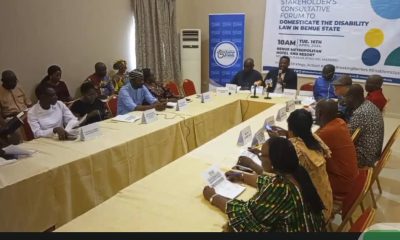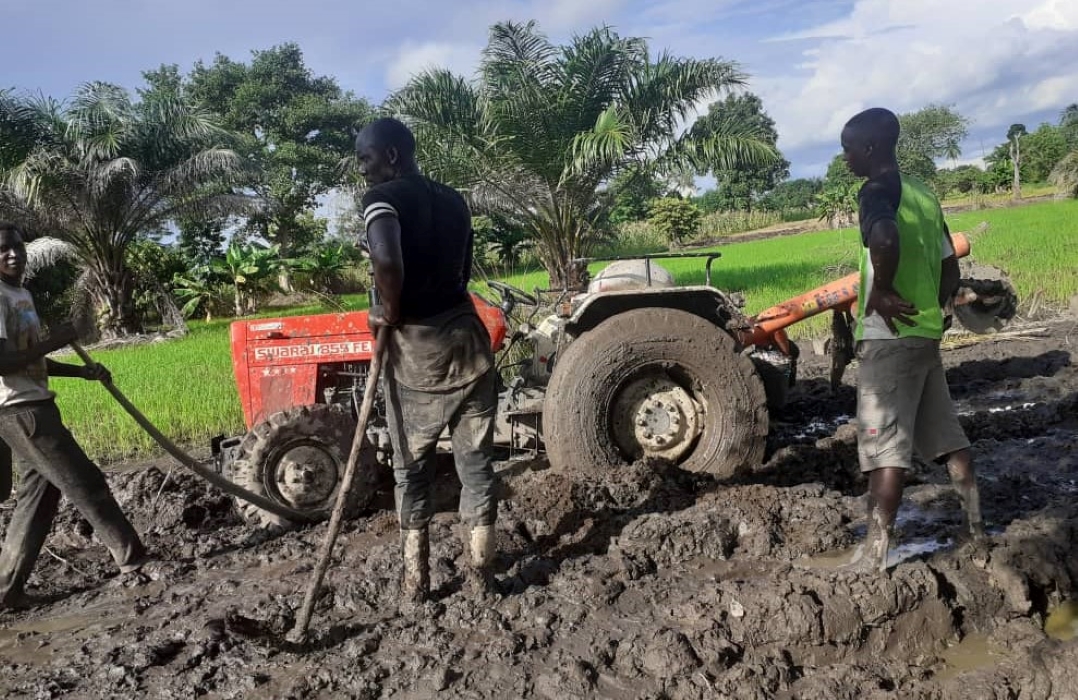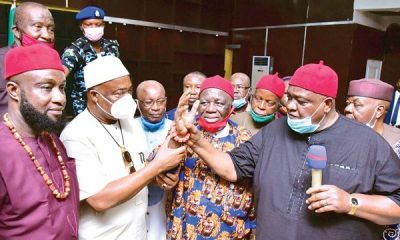BUSINESS
Shift Focus in Africa from Aid to Youth Empowerment, Elumelu Tells US

Tony Elumelu, chairman of the United Bank for Africa (UBA) Plc, has called for a “re-imagined” relationship between the United States and Africa. The Nigerian entrepreneur said the United States needed to shift its focus from providing aid that inevitably encourages dependency to supporting the continent’s institutions that help empower youths through businesses and job creation.
He spoke at a recent event co-hosted by the United States Institute of Peace (USIP) and the Heritage Foundation in Washington.
“Entrepreneurship, peace and conflict are linked one way or the other,” Elumelu said.“Young people who are engaged in bettering their own lives and their communities will reject the lures of extremism and crime.
” Elumele added that for Africa, a strong private sector, spurred by entrepreneurs, was critical to advancing peace, stability and development.Asked what the United States can do to improve Africa’s governance, Elumelu replied that “people are beginning to wonder if the U.S. is still there for Africa because of the foray into Africa by other world powers”.
He, however, said America remains admired and respected. He said a critical step would be to make sure aid makes it past the “last mile” to its intended recipients and purposes; another would be supporting institutional infrastructure that helps address sustainability; and US policymakers and financial institutions should impress on African leaders how their own political goals and private sector success are linked.
Elumelu said there needs to be a reimagining of what Africa needs —”a necessity demonstrated by a dangerous level of youth unemployment that is not improving”.
He said the recent string of coups across Africa should serve as a “wake-up call” for the urgency of addressing the social and economic conditions that lead to political instability.
Elumelu pointed to a partnership with Google as a good example of the relationships that can promote entrepreneurship among young Africans. He said the tech giant has committed a team to expand the training capacity of the Tony Elumelu Foundation’s digital network, which already includes about a million active and aspiring entrepreneurs.
He added that as the foundation’s programme can only accept up to 2,000 students from 350,000 applicants, Google is helping develop a training platform with unlimited reach keyed to African conditions. “That digital partnership is such critical support for Africa,” Elumelu said. “Our internet connectivity? Not so great. Available bandwidth? Not so great. Yet this young African is connected to the rest of the world. And that is an area we know we need to focus on.”
Economy
Seplat Energy Pays $2bn Tax to FG in 10 Years

Seplat Energy, an independent indigenous energy company, on Tuesday, said it had paid two billion dollars tax contribution to the Federal Government of Nigeria since its listing on the Nigerian Exchange Ltd.(NGX) in 2014.
Mr Roger Brown, Chief Executive Officer(CEO), Seplat Energy, revealed this while delivering a speech at the Closing Gong ceremony in Lagos.
The event was to commemorate the company’s 10 years anniversary of dual listing on the Premium Board of the Nigerian EExchange Ltd.
(NGX) and the Main Market of the London Stock Exchange (LSE).Brown stated that the oil and gas company, Seplat, also contributed 2.8 billion dollars as tax to the federal government over the past 13 years, after its establishment in 2009.
He explained that the company paid 1.54 billion dollars as royalty to the government, 329 million dollars as Petroleum Profits Tax, 273 million dollars as Value Added Tax, and 259 million dollars as Witholding Tax.
According to him, the energy firm also paid a tax of 276 million dollars to the Nigerian Delta Development Commission (NDDC) and others as well as 126 million dollars as Pay-As-You-Earn(PAYE).
The CEO stated that at post Initial Public Offering(IPO) of the firm, it generated 1.7 billion dollars in Free Cash Flow(FCF) and invested 1.6 billion dollars in Capex.
He also said that the company had paid dividends worth 575 million dollars between 2014 when it became listed and the financial year ended 2023.
Brown noted that the business of the energy firm continued to generate strong cashflows, reflected in its strong FCF and NCFO generation.
He said: “Similarly, we have generated a cumulative 3.3 billion dollars in net operating cash flow post IPO.
“Our strong cash flow generation has supported our ambitions to expand our business, which has seen us spend an aggregate of 1.6 billion dollars in capital expenditure.
“In over 10 years, we invested 57 million dollars in community projects on health, education and empowerment as strong commitment to community development.
“As a leading supplier of gas to Nigeria’s domestic Gas-To-Power Market, at times Seplat gas powered 20 to 30 of Nigeria’s domestic grid in 2023.”
He expressed delight over the feat, reiterating Seplat Energy’s commitment to leading Nigeria’s energy transition.
According to him, the power of indigenous companies is to bring growth and prosperity to their home countries and the people.
“One example of how Seplat Energy is making an enduring difference to Nigeria and host communities where we operate is that nearly 50 million dollars had been invested by our Joint Venture partnerships in communities since our inception to date,” Brown said.
“Truly, Seplat Energy has delivered significant value by enhancing strategic, operational and financial achievements in 10 years as a listed company,” he added.
In his comments, Mr Temi Popoola, Chief Executive Officer (CEO), NGX Group, emphasised the significance of Seplat Energy’s decade of dual listing.
He said, “If we were to look back to our market and tried to find landmarks, the last major landmark you will find in the last ten years is this transaction that we are celebrating today, and the market is very grateful for that.”
Congratulating Seplat Energy on this milestone, in his welcoming remarks, Alhaji Umaru Kwairanga, NGX Group Chairman, highlighted the importance of partnerships between the NGX and companies like Seplat Energy in driving economic growth and development.
He stated that “Seplat’s journey symbolises resilience, innovation, and a commitment to excellence, making them a beacon of corporate governance and operational expertise.
“Seplat Energy has emerged as a leading indigenous energy company, deeply integrated into Nigeria’s economic landscape and the NGX Group remains committed to supporting companies like Seplat Energy as they drive economic growth and contribute to our nation’s prosperity.”
Reflecting on the significance of the decade of dual listing, Mr Udoma Udo Udoma, Board Chairman, Seplat Energy, remarked, “Seplat Energy is committed to driving Nigeria’s transition to sustainable and affordable energy, harnessing its power to improve lives by transforming the economy.
“We have ambitious goals. We are investing in Nigeria. We will support the federal government’s energy transition policy, and we will partner with FG in whatever area they want us to do.
“That is our commitment. We will grow Seplat while also maintaining the highest standard of corporate governance.”
Also commending Seplat Energy on the decade of listing, Mr Jude Chiemeka, Acting CEO, NGX, stressed the importance of the capital market in helping companies raise funds and create wealth for all.
Chiemeka said, “Seplat Energy was listed at N576 at listing and yesterday it closed at 3,370, which is an increase of over 484 per cent.
“The figures show that in the last 10 years, the company has paid out 575 million dollars in dividend payments to shareholders in Nigeria and London where they are also listed.
“So, this company has given investors a huge opportunity to really participate in wealth creation.
“Reports show that Nigeria would be among the top 20 countries in the next 25 years, and I think Seplat is poised to be one of the institutions driving growth, prosperity, and inclusion in our nation.”
Also, gracing the Closing Gong ceremony was Sen. Heineken Lokpobiri, Minister of State, Petroleum Resources (Oil), who commended the company on it laudable achievements.
“I am happy to be part of today’s celebration and Seplat’s exceptional performance in the last ten years and as Minister of State, Petroleum Resources,
“I assure you that we will partner with Seplat to expand their investments, not only for the benefit of its shareholders, but also for Nigeria.
“The least the government can do anywhere in the world is to create an environment where companies like Seplat continue to thrive.”(NAN)
Economy
34 States Shunned 35th Enugu Int’l Trade Fair
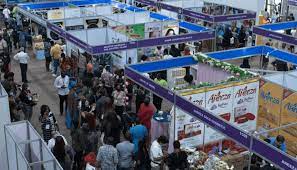
No Fewer than 34 states in the country failed to honour invitation to attend the just-concluded 35th Enugu International Trade Fair.
Reports says that only the Federal Capital Territory (FCT), Abuja; Ebonyi State and the host state, Enugu State, graced the 11-day international goods, services and idea showcasing fiesta.
The fair, which began on April 5 and ended on Monday, April 15, was themed: “Promoting made-in-Nigeria products for global competitiveness.
”Reacting, the Director-General of Enugu Chamber of Commerce, Mr Uche Mbah, said that the chamber followed due diligence in the invitation of all states to the fair.
Mbah noted that official letters were sent and official follow-up on the letters were made to ensure their presence and availability.
According to him, “we did everything to get them to add colour and increase the showcasing of products from different parts of the country and their investment viability.
“We did put in spirited efforts to see that all states participated, as most of them do previously.
“But it is unfortunate that many did not respond after receiving official letters, phone calls and interpersonal follow-ups were made.
“We got clear assurances from Kano State but they did not show up.
“We pushed harder to get Abia State but in the end, we were told that the governor did not approve,” he said.
Reports says that over 100 organisations were at the fair, which included: over 50 private companies as well as over 45 Federal and State government ministries, agencies and departments. (NAN)
BUSINESS
Fidelity Bank Posts N124.3bn Pre-tax Profit in 2023
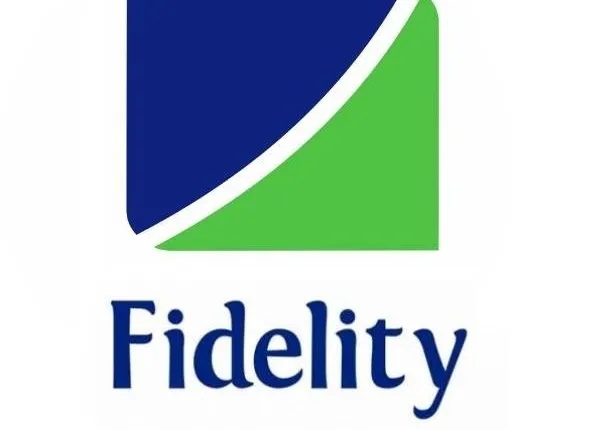
Fidelity Bank Plc has recorded a profit before tax of N124.3 billion for the year ended Dec. 31, 2023, indicating 131.5 per cent increase from N53.7 billion posted in the 2022 finacial year.
The bank disclosed this in its 2023 full year audited financial statement issued to the Nigerian Exchange Ltd.
(NGX) on Tuesday in Lagos.Fidelity Bank said it would also be paying investors a final dividend of 60k per share and total dividend of 85 kobo per share for the reporting period.
This represents a 70 per cent increase compared to the 50 kobo per share paid to its shareholders in the previous year.
The financial institution stated that this led to an increase in Return on Average Equity (RoAE) of 26.
5 per cent in the year under review, from 15.6 per cent in the corresponding year.According to the financial statement, the bank grew its gross earnings by 64.9 per cent year-on-year, to N555.83 billion.
The bank stated that this was driven by 81.6 per cent growth in net interest income which increased from N152.7 billion in year 2022 to N277.37 billion in the 2023 financial year.
This led to a profit after tax of N99.45 billion, representing a 112.9 per cent annual growth.
Commenting on the performance, Dr Nneka Onyeali-Ikpe, Managing Director, Fidelity Bank, said that the financial institution closed the financial year with strong double-digit growth across key income and balance-sheet lines.
Onyeali-Ikpe stated that the bank’s performance in 2023 was an attestation of its capacity to deliver superior returns to shareholders despite the difficulties in our operating environment.
She said: “A review of the financial performance showed that the bank grew its net interest income by 81.6 per cent to N277.4 billion.
“This was driven by a 55.5 per cent increase in interest income, thus reflecting a steady rise in asset yield throughout the year.
“The average funding cost dropped by 20bps to 4.4 per cent due to increased low-cost funds that grew from 83.6 per ent in 2022 to 97.4 per cent in 2023.
“The combination of higher asset yield and lower funding cost led to an increase in Net Interest Margin (NIM) of 8.1 per cent from 6.3 per cent in 2022 financial year.”
According to her, the total customer deposits crossed the N4 trillion mark, as deposits grew by 55.6 per cent from N2.6 trillion in 2022.
She noted that the increase was driven by 81.1 per cent growth in low-cost funds.
Onyeali-Ikpe explained that despite the challenging operating environment, the bank reaffirmed its devotion to helping individuals grow and inspiring businesses to thrive.
She said the bank also committed to empowering economies to prosper by increasing net loans and advances to N3.1 trillion from N2.1 trillion in 2022 financial year.
The managing director stated that despite the growth in its loan portfolio, regulatory ratios were maintained well above the required thresholds.
Onyeali-Ikpe noted that the bank liquidity ratio stood at 45.3 per cent in the year ended 2023, from 39.6 per cent in the year 2022, while capital adequacy ratio rose to 16.2 per cent, compared to the minimum requirement of 15.0 per cent.
“We recognise the changing dynamics in the Nigerian banking space and the need to monitor and proactively manage evolving risks.
“The proposed final dividend of 60 kobo per share reflects our commitment to strong value creation and returns to our shareholders.
“Fidelity Bank has consistently paid dividend since 2006,” she said.(NAN)


